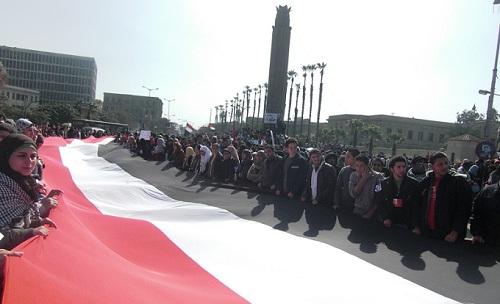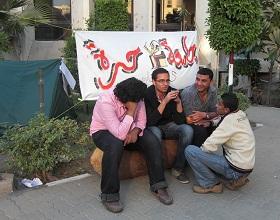Using AI to control energy for indoor agriculture
30 September 2024
Published online 6 May 2012

Egyptians head to the polls on the 23 May to elect a new president for the first time in over 30 years. As the electioneering heats up, presidential candidates reveal manifestos and detail how they would do things differently. Nature Middle East hears what the presidential hopefuls have to say about education and scientific research.
Amr Moussa, a frontrunner popular liberal candidate with 41% approval rating in the latest polls, has promised to focus on scientific research and technical training if elected. He is committed to maintaining free education and promises that the ministry of scientific research will publish a national research strategy within his first 100 days of office. Moussa will instruct universities to become centres of science research and innovation, with competitive funding for research projects as part of the national plan. Moussa hopes to promote research that addresses the problems of the private sector, and, in turn, encourage more investment.
Egypt spends less than 10% of gross domestic product (GDP) on education, and less than 0.5% on scientific research. This has created a stagnant science environment and crowded, ill-equipped schools and universities to the continual frustration of teachers and researchers alike.
Moussa plans to increase science research from the current 0.24% of GDP up to 2% by 2016, though he does not explain where the money will come from. Researchers should focus on applied research, says Moussa, and maximize their use of funding opportunities available from Arab and international institutes supporting science.

Abd El-Moniem Abolfotoh, a popular, left-leaning candidate and physician who is currently secretary general of the Arab Medical Union, launched his election campaign at an event held at Azhar Park in Cairo on 2 April 2012.
Education and science research are issues of national security, and should serve the needs of the people rather than an elitist ruling class, says Abolfotoh, whose approval rating has increased last month to 27%. "I will abide by my promise to increase funding for education to 25% of the national budget within four years rather than the stagnant 10% of the past."
"Our programme is a national project that does not only contend with keeping education free for everyone, but it will liberate us from the current centralization, allowing universities to be autonomous, with their independent budget and management," says Rabab Al-Mahdy, Abolfotoh's political advisor and a political science professor at the American University in Cairo.
Mahdy says that scientific research will not just focus on collaborations with the West, but also help form relationships with emerging economies such as China and Brazil. "For us, science research is a core issue, not a luxury."
Abolfotoh, a one-time high-ranking member of the Muslim Brotherhood before being expelled for deciding to run in the elections against their will, pledges to enact progressive taxation policies and raise income taxes to fund an increase in research spending to 6% of GDP. "We need to focus on issues relevant to our needs, such as renewable energy and agricultural research and to come up with science-based solutions for food security," adds Mahdy.
Critics have challenged Abolfotoh's plans as overly ambitious. "Education is the winning horse in the upcoming elections. How does he plan to raise education spending from less than 7% to a whopping 25%?" says Gihan Soliman, an educational consultant & master's researcher at the Institute of Environmental Studies & Research, Ain Shams University.. "Besides, if a quarter of our budget goes to education, what happens to other challenges like health, housing and food security amongst others?"
You cannot have a country that seeks modernization and progress but opposes teaching the theories and work of Charles Darwin on evolution.
Hamdeen Sabahi, a socialist candidate with 7.4% approval and leader of the Nasserist Dignity Party, promises to revise the national budget to put education and science top of the agenda. Sabahi's vision is to make Egypt a leading nation within 18 years.
Bahey El-Deen Argoon, a professor of aerospace engineering at Cairo University and Sabahi's campaign manager, says the programme contends to promote technical education, and focus on promoting technologies aligned with the national resources plentiful in Egypt's deserts, such as silicon-based industries, and making use of the large expatriate Egyptian community.
"The white sands of Sinai are perfect for producing silicon sheets used in electronics, solar cells and optical fibres. Yet we export this sand very cheaply," says Argoon. "This needs to change once we have the know-how in place."
Argoon adds that, with a focus on renewable energy, Egypt will be producing 20% of its energy from solar sources within 8 years, making it one of the world's leading producers of solar energy.
Sabahi also stresses the importance of overhauling the education system to promote critical thinking rather than the current rote learning widespread in most schools, and linking education to the needs of the market to produce a strong workforce.

Forty-year-old leftwing presidential candidate Khaled Aly, the youngest person running for presidency but least popular, recognizes that many of the challenges Egypt currently faces will need a science solution, such as the loss of arable land, energy and food insecurity, climate change and rising sea levels. "Dealing with these problems will require a national approach with all government ministries working together," he adds.
If he becomes president, Aly vows to raise the national education budget to 15% of GDP, while providing researchers with well-equipped labs and bigger pay packets. He calls for autonomous universities and drafting laws that empower students to exercise their political freedom, and banning security forces from interfering within campuses.
Adel Wessely, the head of Aly's campaign, stresses that Aly's programme is special because it will allow complete academic freedoms previously punished by the old regime. "You cannot have a country that seeks modernization and progress but opposes teaching the theories and work of Charles Darwin on evolution." He adds that science research will not be restricted and rote learning must be completely abolished from schools. "We will not allow religion to interfere in everything."
In addition to promises similar to the other candidates, Wessely stresses that Aly wants to include students in the policy-making process that determines how education should be overhauled.
Besides renewable energy research, Aly also wants to promote nuclear energy. He promises to renovate Egypt's space programme so the country can build its own satellites rather than importing parts and assembling them. Recently, the budget for the space programmes has been severely cut down to US$7.5 million, barely enough to pay salaries. Egypt does not have any research satellites in orbit after losing communication with the only satellite it previously had.
Issues of poverty and unemployment may be a more powerful determinant in the upcoming elections, however, for a country where a fifth of the population survives on less than US$2 a day. "Research and development play an insignificant role in the life of the average Egyptian, let alone Egyptian policy," says Mohamed Abdel-Mottaleb, director of the nanotechnology research center, Nile University.
"Increasing spending on education is good but far from enough. We need to better plan our funds to make the best of the money we have to give students a proper education," adds Soliman.
doi:10.1038/nmiddleeast.2012.67
Stay connected: